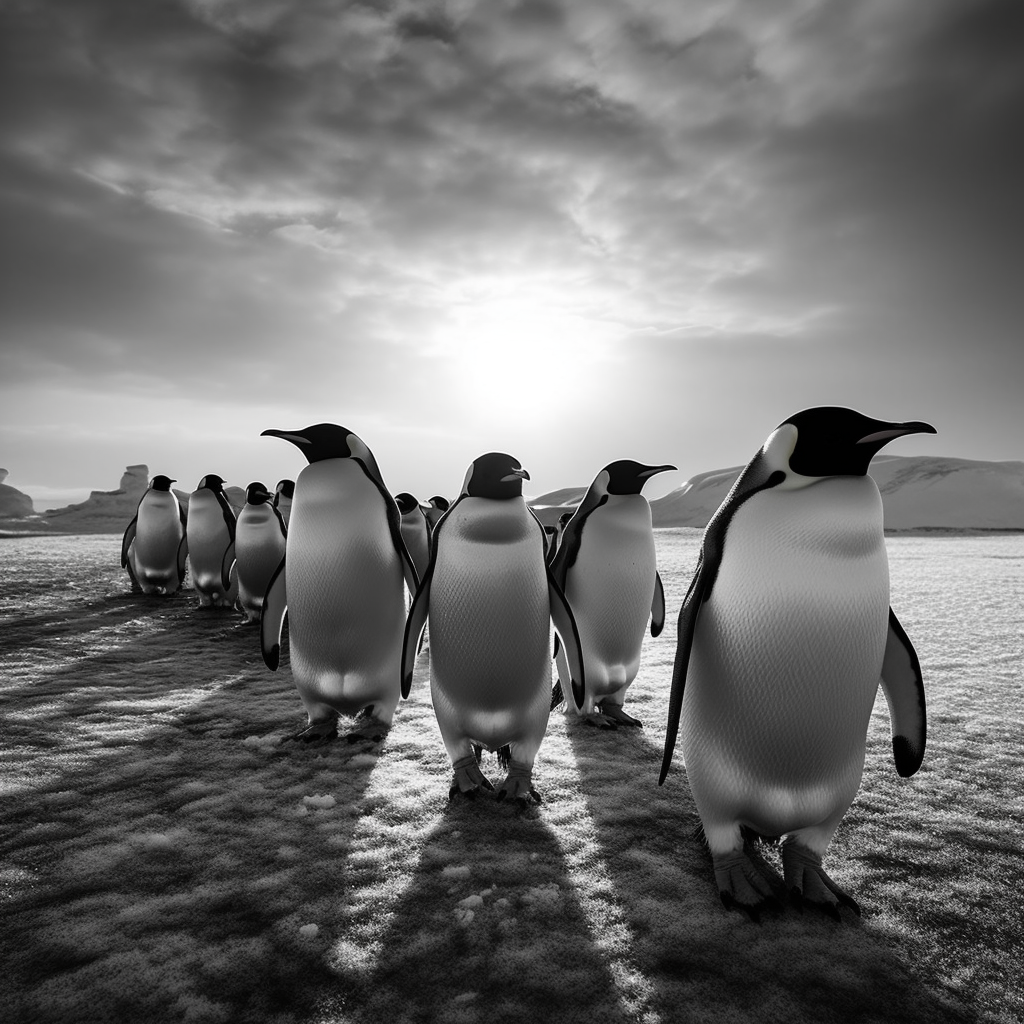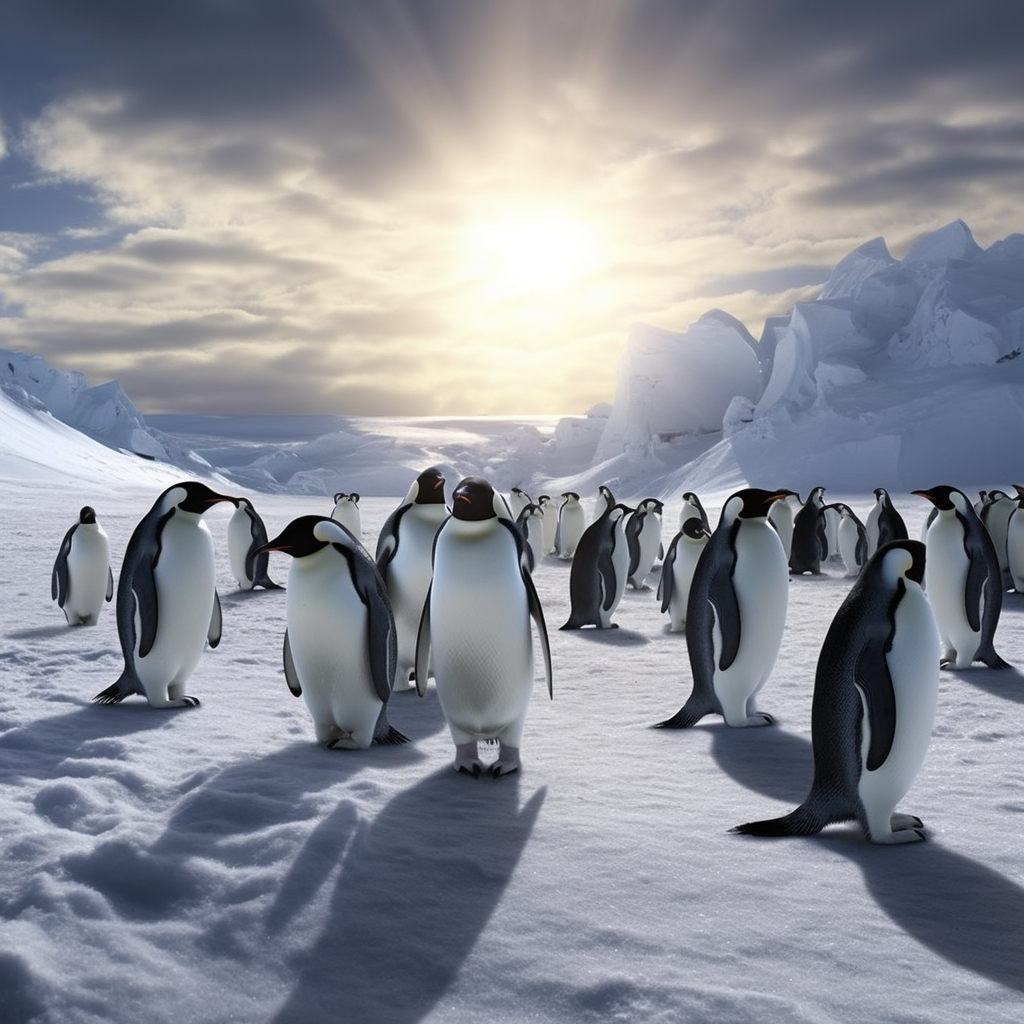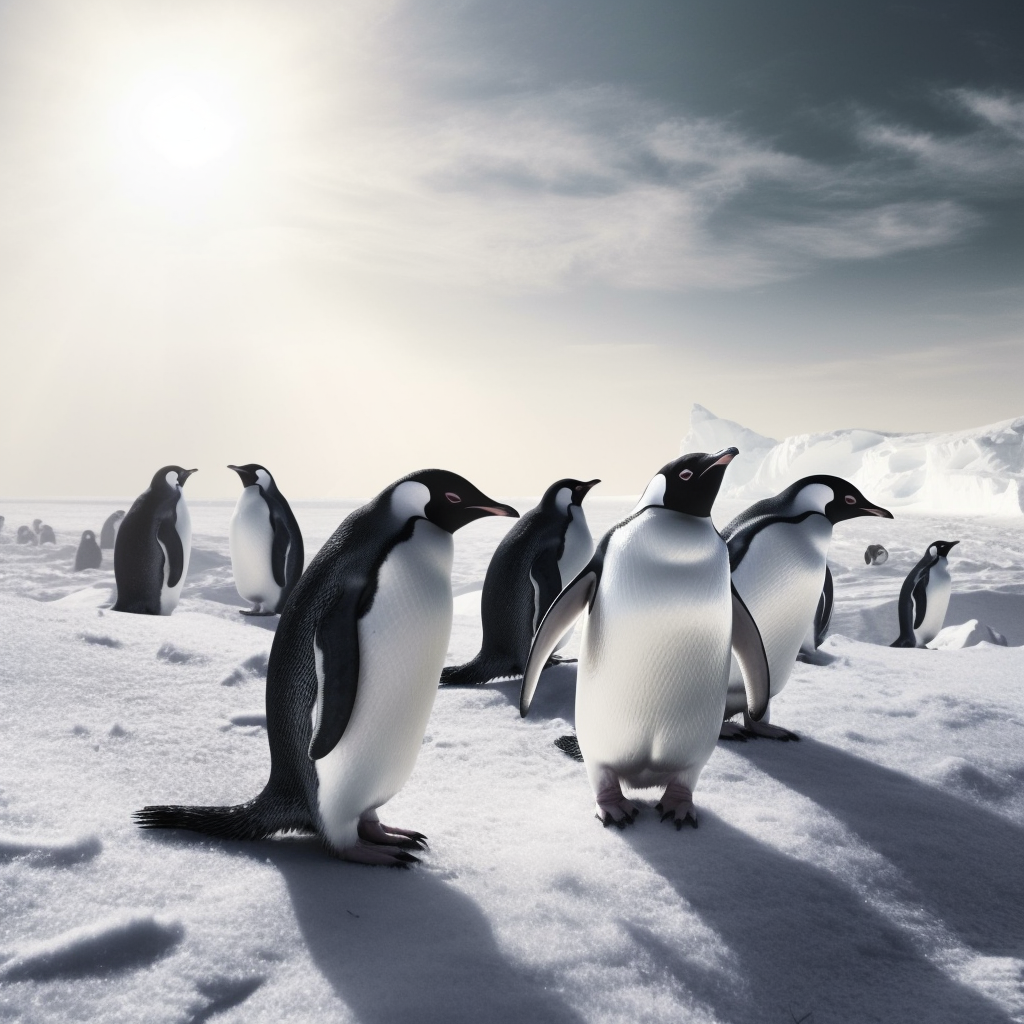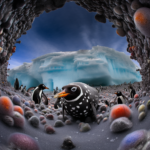Do Penguins Eat Their Young?
Penguins are fascinating creatures that have captured the hearts of many people around the world. These flightless birds are known for their unique appearance, adorable waddling walk, and their ability to survive in some of the harshest environments on Earth. However, there is a question that often arises when it comes to penguins: do they eat their young? In this article, we will explore this intriguing topic and shed light on the truth behind this common misconception. So, let’s dive in and discover the truth about whether penguins really eat their young.
Key Takeaways
- Penguins do not eat their young.
- Both male and female penguins play an active role in raising their chicks.
- The parents take turns incubating the eggs and feeding the chicks.
- Cannibalism among penguins is extremely rare and only occurs in exceptional circumstances.
Understanding Penguin Parenting

A. The Role of Male and Female Penguins in Raising Young
Penguins are known for their unique and fascinating parenting behaviors. Unlike many other bird species, penguins exhibit a high level of parental involvement from both the male and female. In fact, penguins are known for their cooperative breeding, where both parents play an active role in raising their young.
In most penguin species, the male and female take turns incubating the eggs. After the female lays the egg, she transfers it to the male, who then keeps it warm by balancing it on his feet and covering it with a special brood pouch. This allows the male penguin to protect the egg from the harsh Antarctic elements while the female goes out to sea to feed and regain her strength.
Once the egg hatches, the parents continue to work together to care for their chick. Both the male and female take turns feeding the chick, regurgitating partially digested food into its mouth. This feeding process provides the chick with the necessary nutrients for growth and development.
B. How Long Do Penguins Feed Their Young?
The duration of penguin chick feeding varies depending on the species. Generally, penguin chicks are fed by their parents for several months until they are old enough to fend for themselves. During this time, the parents tirelessly hunt for food and return to the colony to feed their hungry chicks.
For example, in the case of Emperor Penguins, the largest species of penguins, the parents take turns traveling long distances to the ocean to catch fish and squid. They then return to the colony and regurgitate the food for their chicks. This feeding process continues for about four months until the chicks are fully grown and ready to survive on their own.
It’s important to note that while penguins are dedicated parents, there is a common misconception that they eat their young. This is not true. Penguins do not engage in cannibalism or intentionally harm their chicks. They go to great lengths to protect and care for their offspring, ensuring their survival in the harsh Antarctic environment.
In conclusion, penguins are remarkable creatures when it comes to parenting. Both male and female penguins actively participate in raising their young, taking turns incubating the eggs and feeding the chicks. This cooperative breeding behavior sets penguins apart from many other bird species. So, the next time you think about penguins, remember their dedication and commitment to their little ones.
The Feeding Process of Penguins
Penguins are fascinating creatures that have captured the hearts of many. They are known for their unique behaviors, including their feeding habits. In this section, we will explore how penguins feed their young and the different strategies employed by different species.
A. Do Penguins Feed Their Babies Milk?
When it comes to feeding their young, penguins have a rather interesting approach. Unlike mammals that produce milk to nourish their offspring, penguins do not produce milk. Instead, they rely on regurgitation to feed their chicks.
Once the penguin chicks hatch, both the male and female penguins take turns incubating the eggs and caring for the chicks. When it’s time to feed, the parent penguin will head out to the ocean to hunt for food. They dive into the water, using their streamlined bodies to swim swiftly and catch fish, squid, and krill.
After a successful hunt, the parent penguin will return to the nest with a belly full of food. They regurgitate the partially digested food, which is rich in nutrients, into the mouth of their hungry chick. This regurgitated food is often referred to as “penguin milk” due to its resemblance to mammalian milk.
B. How Do Emperor Penguins Feed Their Babies?
Emperor penguins, the largest of all penguin species, have a unique feeding strategy. These remarkable creatures breed in the harsh conditions of Antarctica, where food can be scarce. To ensure the survival of their chicks, emperor penguins go to great lengths.
After laying their eggs, the female emperor penguin transfers the egg to the male for incubation. During this time, the female heads out to sea to replenish her energy reserves by feeding on fish and krill. She may travel long distances, enduring extreme cold and treacherous conditions, to find food.
Once the female returns, it’s the male‘s turn to venture out in search of food. He may travel even greater distances, diving deep into the icy waters to catch fish and squid. After a successful hunt, the male returns to the breeding colony with a belly full of food.
The male emperor penguin regurgitates the food for the hungry chick, allowing it to feed and grow. This feeding process is crucial for the chick’s survival, as it provides the necessary nutrients for its development.
C. How Do Adelie Penguins Feed Their Young?
Adelie penguins, another species found in Antarctica, have their own unique way of feeding their young. These small, agile penguins rely on krill as their primary food source.
Similar to other penguin species, both the male and female Adelie penguins take turns incubating the eggs and caring for the chicks. When it’s time to feed, the parent penguin heads out to sea to hunt for krill.
Adelie penguins are skilled divers and can swim up to 150 meters deep in search of their prey. They use their streamlined bodies and strong flippers to navigate through the water with ease. Once they locate a school of krill, they scoop them up in their beaks, swallowing them whole.
Back at the nest, the parent penguin regurgitates the krill for the chick to consume. This process ensures that the chick receives the necessary nutrients for its growth and development.
In conclusion, penguins have unique feeding strategies to ensure the survival of their young. From regurgitating partially digested food to diving deep into the ocean for prey, these remarkable creatures have adapted to their environment to provide for their offspring. Understanding the feeding process of penguins allows us to appreciate the incredible efforts they make to ensure the survival of their species.
Debunking Myths: Do Penguins Eat Their Young?

A. The Misconception of Penguins Eating Their Young
Penguins are fascinating creatures that have captured the hearts of many people around the world. However, there are several misconceptions about penguins, one of which is the belief that they eat their young. This misconception may have arisen from observing certain behaviors exhibited by penguins, but it is important to understand the truth behind these behaviors.
While it is true that penguins engage in regurgitation as a means of feeding their chicks, this should not be confused with cannibalism. Penguins regurgitate food to provide nourishment to their young, but they do not consume their offspring. This behavior is a vital part of their parental care and ensures the survival and growth of their chicks.
B. Why Do Penguins Regurgitate Feed Their Young?
Penguins have a unique way of feeding their young. After the female penguin lays her eggs, both the male and female take turns incubating the eggs to keep them warm. Once the eggs hatch, the parents continue to take turns caring for the chicks.
Penguins regurgitate food for their young because it is an efficient way to provide them with the necessary nutrients. The parents consume fish, squid, and krill from the ocean and store the food in their stomachs. When it’s time to feed the chicks, the parents bring up the partially digested food and regurgitate it into the mouths of their offspring.
This process allows the chicks to receive a nutrient-rich diet without the need for the parents to leave them unattended for long periods in search of food. It also helps the chicks develop a strong bond with their parents, as they associate regurgitation with nourishment and care.
C. Do Penguins Eat Their Own Poop?
Another common misconception about penguins is that they eat their own poop. While it may sound strange, there is some truth to this belief. Penguins, like many other animals, produce fecal matter that contains undigested food particles. In some cases, penguins may inadvertently consume their own feces while grooming or during other activities.
However, it is important to note that penguins do not rely on eating their own poop as a source of nutrition. Their primary diet consists of fish, squid, and krill, which provide them with the necessary nutrients for survival. Eating their own feces is more of an accidental occurrence rather than a deliberate behavior.
In conclusion, penguins do not eat their young. The misconception likely stems from the regurgitation behavior exhibited by penguins when feeding their chicks. This regurgitation is a crucial part of their parental care and ensures the well-being of their offspring. Additionally, while penguins may accidentally consume their own feces, it is not a significant part of their diet. Penguins are remarkable creatures that exhibit unique behaviors to ensure the survival and growth of their young.
The Harsh Reality: Survival of the Fittest
A. Why Do Mother Penguins Leave Their Young?
In the harsh and unforgiving world of Antarctica, survival is a constant struggle for penguins. These remarkable creatures have adapted to extreme conditions, but even so, the odds are stacked against them. One of the most intriguing aspects of penguin behavior is the phenomenon of mother penguins leaving their young behind.
Contrary to what one might expect, mother penguins do not abandon their chicks out of negligence or cruelty. In fact, their departure is a carefully calculated decision made in the best interest of the chick’s survival. Penguins face numerous challenges in their quest to raise their young, and sometimes, leaving them behind is the only option.
When a mother penguin leaves her chick, it is usually because she needs to go on a long and arduous journey to find food. Penguins rely on a diet of fish, squid, and krill, which can be scarce in the vast Antarctic waters. The mother’s departure allows her to travel long distances in search of sustenance, ensuring her own survival and increasing the chances of successfully raising future offspring.
B. Do Penguins Leave Their Young?
While it may seem heartless for a mother penguin to leave her chick, it is important to understand that penguins have evolved to cope with these challenging circumstances. Penguins are highly social animals, and they rely on the support of their colony to survive. When a mother penguin leaves her chick, it is not left entirely alone.
Within the colony, there is a system of communal care where other adult penguins step in to provide protection and warmth to the abandoned chicks. These “babysitters” take turns looking after the chicks, ensuring they are kept safe and warm until their mother returns. This cooperative behavior is crucial for the survival of the chicks and helps to alleviate the burden on individual parents.
C. Do Penguins Kill Their Young?
Contrary to popular belief, penguins do not kill their young. The idea that penguins engage in cannibalism or intentionally harm their offspring is a misconception. While there have been rare instances of aggression between adult penguins and chicks, these cases are the exception rather than the norm.
Penguins are devoted parents and invest a significant amount of time and energy in raising their young. From incubating the eggs to feeding and protecting the chicks, penguins exhibit remarkable dedication to their offspring. The bond between parent and chick is strong, and instances of harm inflicted by adult penguins are extremely rare.
In conclusion, while it may be difficult to comprehend why mother penguins leave their young, it is important to remember that their actions are driven by the harsh realities of survival in Antarctica. By leaving their chicks temporarily, mother penguins increase the chances of finding food and ensuring the survival of future generations. The communal care within the penguin colony further supports the well-being of abandoned chicks. It is crucial to dispel misconceptions about penguins and understand the complex dynamics of their behavior in order to appreciate and protect these incredible creatures.
The Intricacies of Penguin Behavior

Penguins are fascinating creatures that have captured the hearts of many. Their unique behaviors and adaptations to their environment make them a subject of great interest for scientists and nature enthusiasts alike. In this section, we will delve into the intricacies of penguin behavior, exploring why they eat, how they take care of their young, and the surprising phenomenon of penguins killing their own offspring.
A. Why Do Penguins Eat?
Penguins, like all animals, need to eat in order to survive. Their diet primarily consists of fish, squid, and krill, which they catch while swimming in the ocean. Penguins are excellent hunters, using their streamlined bodies and powerful flippers to propel themselves through the water with remarkable speed and agility.
However, there are instances where penguins have been observed eating their own young. This behavior, known as filial cannibalism, is relatively rare and occurs in certain penguin species. It is important to note that not all penguins engage in this behavior, and it is not a common occurrence.
B. Do Penguins Take Care of Their Young?
Penguins are known for their strong parental instincts and their dedication to caring for their offspring. After mating, female penguins lay one or two eggs, which are then incubated by both parents. The incubation period can last anywhere from a few weeks to a couple of months, depending on the species.
During this time, the parents take turns incubating the eggs, with one parent staying at the nest while the other goes out to feed. This behavior ensures that the eggs are kept warm and protected from the harsh Antarctic environment. Once the eggs hatch, both parents take on the responsibility of feeding and caring for the chicks.
C. Why Do Penguins Kill Their Young?
While it may seem counterintuitive, there have been instances where penguins kill their own young. This behavior, known as chick predation, is more commonly observed in certain penguin species, such as the Adélie penguin. It is believed to occur due to a combination of factors, including competition for resources and the harsh conditions of their environment.
Chick predation can occur for various reasons. In some cases, it may be a result of food scarcity, where the parents are unable to find enough food to sustain both themselves and their chicks. In other cases, it may be a form of natural selection, where weaker or sickly chicks are culled to ensure the survival of the fittest.
It is important to note that chick predation is not the norm for penguins, and the majority of penguin parents are dedicated to the survival and well-being of their offspring. However, it is a behavior that has been observed and studied, shedding light on the complexities of penguin behavior and the challenges they face in their environment.
In conclusion, penguins exhibit a range of behaviors when it comes to their young. While most penguins are devoted parents, there are instances where they may resort to cannibalism or chick predation. These behaviors are not common and are influenced by various factors such as resource availability and environmental conditions. By studying these behaviors, scientists can gain a deeper understanding of penguins and their unique adaptations to the Antarctic ecosystem. Conclusion
In conclusion, while it may seem shocking to think that penguins eat their young, the reality is that this behavior is extremely rare and only occurs in extreme circumstances. Penguins are known for their strong parental instincts and their dedication to raising their offspring. They go to great lengths to protect and care for their chicks, often enduring harsh conditions and making long journeys to find food. The bond between parent and chick is strong, and it is this bond that ensures the survival of the species. So, rest assured, penguins are not cannibalistic creatures, but rather loving and devoted parents who will do whatever it takes to ensure the survival of their young.
Frequently Asked Questions
Do penguins regurgitate to feed their young?
Yes, both male and female penguins regurgitate a nutrient-rich substance to feed their young. This is a common practice among many bird species, not just penguins.
Why do mother penguins leave their young?
Mother penguins do not typically abandon their young. However, they may leave for short periods to hunt for food, both for themselves and to feed their chicks. During this time, the male penguin usually takes over the care of the chicks.
Do penguins eat their young?
No, penguins do not eat their young. This is a common misconception about penguins and other bird species. Penguins are very caring parents and go to great lengths to protect and feed their chicks.
How do emperor penguins feed their babies?
Emperor penguins feed their chicks by regurgitating a nutrient-rich substance from their stomachs. The chicks then eat this substance directly from the parent’s beak.
Do penguins kill their young?
No, penguins do not kill their young. Penguins are known for their strong parental instincts and will fiercely protect their chicks from predators.
How do Adelie penguins feed their young?
Like other penguin species, Adelie penguins feed their young by regurgitating a nutrient-rich substance. The chicks then eat this substance directly from the parent’s beak.
Why do penguins eat?
Penguins eat to sustain their energy levels and to obtain nutrients. Their diet mainly consists of small marine animals such as fish, squid, and krill.
Do penguins leave their young?
Penguins do leave their young temporarily to hunt for food, but they do not abandon them. The other parent stays behind to protect the chick during this time.
How long do penguins feed their young?
Penguins feed their young until they are strong enough to hunt for their own food. This period varies among species but typically lasts for several months.
Do penguins feed milk to their young?
No, penguins do not feed milk to their young. Unlike mammals, birds do not produce milk. Instead, penguins feed their chicks by regurgitating a nutrient-rich substance from their stomachs.




